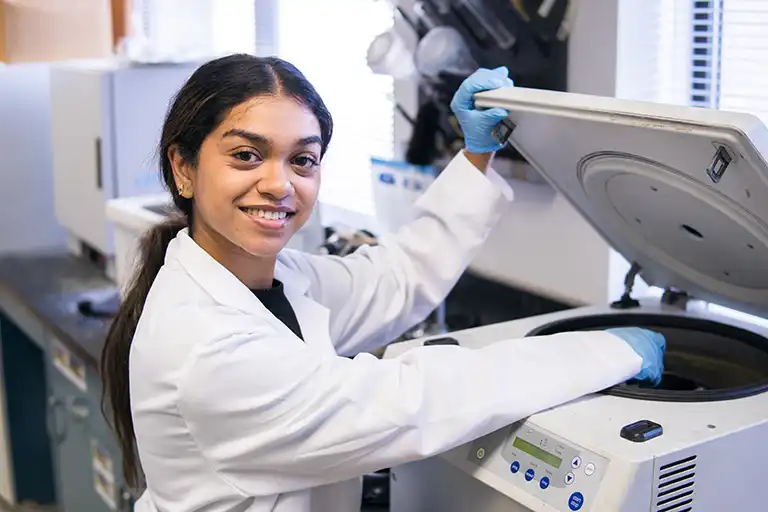What can you tell us about the research you are doing this summer?
Under the guidance of Dr. Rajesh Sardar, I've been involved in research focusing on nanoparticle-based biosensors for the early detection of gastrointestinal cancer biomarkers. Specifically, we've been developing highly sensitive biosensors using gold nanoparticles and spiropyran (a type of organic chemical compound) to detect microRNAs and proteins in human plasma samples. This technology aims to improve diagnostic accuracy and improve early cancer detection methods.
Why were you interested in participating in this program?
I was eager to participate in this program because it aligns perfectly with my career aspirations as a future physician. The opportunity to work alongside Dr. Sardar’s team not only allowed me to gain hands-on experience in nanotechnology but also provided insight into the practical application of research in combating diseases like cancer.
What is one thing you have learned this summer?
One important thing I learned this summer is how nanoparticle-based biosensors are used in biomedical research. Before this experience, I had a rudimentary understanding of how nanoparticles could be used in diagnostics but working in the lab under Dr. Sardar's guidance showed me just how versatile these biosensors can be.
What has surprised you about the experience?
Something that surprised me during my summer research experience was how much depth there is to nanoparticle-based biosensors. I learned a lot under my PhD mentor, Sarah Langlais, but I also see how much more there is to learn. What amazed me the most was seeing how these biosensors can detect tiny amounts of biomarkers in patient samples.
The teamwork in our lab was also impressive; everyone helped each other out. Overall, I now appreciate how important this technology is in improving medical testing, even though I've only scratched the surface of understanding it.
How has this program impacted your future career aspirations?
Participating in this program has solidified my commitment to pursuing a career in medicine. Witnessing firsthand how innovative technologies can improve diagnostic precision and patient outcomes has inspired me to integrate research into my future medical practice.
Tell us about a particularly interesting day or experience you’ve had in the program.
Although it’s a 10-week program, it was incredibly rewarding to see months of research and experimentation culminate in data that could potentially contribute to the early detection of gastrointestinal cancer.
What is something you’ll remember learning from your mentor this summer?
This summer, I learned a lot from my mentor, Dr. Sardar. One of the most important parts was how to present my research in group meetings. The experience taught me how to organize my ideas clearly and explain why reasoning so everyone could understand. Dr. Sardar’s lab showed me the value of teamwork and how different skills can come together to solve big problems.
Do you have advice for future summer program participants?
For future summer program participants, I would advise fully immersing yourself in every aspect of the research experience. Asking questions and collaborating with mentors and peers was a highlight for me. This experience undoubtedly shaped my academic and professional journey.





